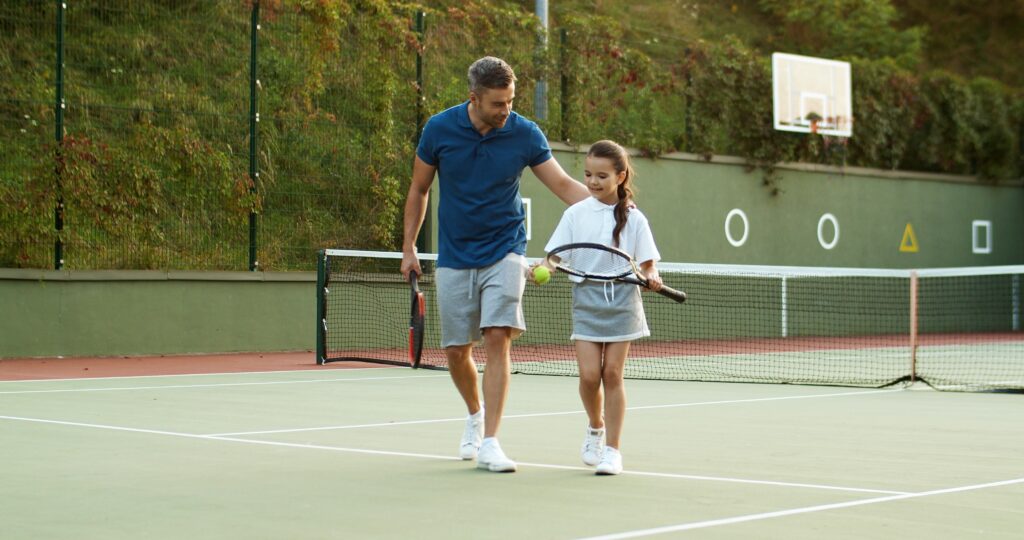One of the hardest parts of parenting is overcoming the urge to fight your child’s battles for them. As our children grow, we must let them learn to stand up for themselves and face their battles head-on. If you hang around a gym or field for long enough, you will see evidence of this parental struggle. Whether it’s a fight for playing time or a conflict with a coach, parents step into their athlete’s battles, not realizing that their actions are causing more harm than good.
On many occasions it’s taken all my self-control to not step in and stand up for my child at a game. To be honest, I’ve been guilty of succumbing to that urge more than once. Every time I did step in, however, I quickly realized wasn’t doing my athlete any favors. No matter the situation, you’re not actually saving the day when you step in to do so. In fact, the opposite is often true. As our kids grow up, we hinder them from growing in their independence when we do not teach them to stand up for themselves and fight their own battles.
Here are three ways to aide your athlete in learning to fight their own battles.
1. Listen
This is where the lesson begins. When your kids are ready to tell you about their struggles, listen more than you speak. When my kids get in the car after practice the last thing they want is to answer a bunch of questions about how it went. One simple question, such as, “how was your day” is plenty enough until they are ready to talk. Once they begin sharing, let them express their feelings to you without casting any judgment.
Once you fully understand how your child is feeling, you can help them decide the best way to handle their situation and fight the battle they are facing. Forcing your opinion before you fully grasp the situation will rarely result in actual help to them.
2. Teach them how to appropriately confront their battles
Discuss with them how they can approach their coach with a problem. My husband coached for 28 years and he explains that there are good and bad ways to confront a coach. The worst way is an approach like this: “How come I’m not playing more? I’m better than Joe or Susie!”
Encourage your child not to pester their coach with their frustrations. Coaches do not like to be nagged. Instead, suggest they say, “what can I do to get more playing time?” or “what do you think I need to get better at?” In this way, the athlete is taking the responsibility upon themself to improve. They do not come across as a complainer or accuser, rather, they appear to their coach as an athlete willing to earn their opportunities.
3. Prepare them for a long fight
Some battles cannot be won overnight. Sometimes they can even last for full seasons. When our kids were discouraged about their playing time or their performance, we told them to keep fighting and continue working hard. I’d like to say that their persistence was always rewarded, but unfortunately not all games and seasons have happy endings.
I’ve seen my daughter win the battle for starting libero by mid-season and I’ve seen my son struggle until the very last game with a basketball coach he could never seem to please. In both cases, our kids fought their own battle every step of the way, with my husband and I cheering from the sidelines.
Since our children were small, we’ve taught them how to fight their own battles. And now we are reaping the rewards as we see our two college athletes—one a senior football player and one a sophomore volleyball player—continue to stand strong in conflict.
Let your athlete take on their own problems, and fight their own battles. Long after the balls and bats and hoops start to gather dust in the garage, the life lessons your athletes learned as they fought those battles on the court and field will prepare them just a little bit more for the battles of life that lay ahead.

With our 100% money-back guarantee and vetted coaches, anyone can achieve their full athletic potential. CoachUp is the safest and easiest way to find a coach for personalized training. Find your perfect coach today and become the athlete you want to be!
How useful was this post?
Click on a star to rate it!
Average rating 4.9 / 5. Vote count: 14
No votes so far! Be the first to rate this post.





One Response
How ironic that I took my son last night for his nightly workout, and when we returned home, I asked him how he thought the workouts have been. I asked him what his plan is because he allows me to keep guessing on his thoughts about his plan and journey for college. He said he is seeing and feeling good about our workouts and his workouts with (private paid coach) Coach Courtney. He mentioned how frustrated he was with the HS season and I told him I understand and there is capabilites on all parts. I suggested that he start communicating more with the coaches and asking what he can do to get better if he can get on a college football roster. I suggested that he not allow someone that refuse to see or develop him to still his joy and allow that to be a lesson in communicating and preparing.